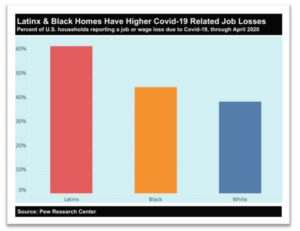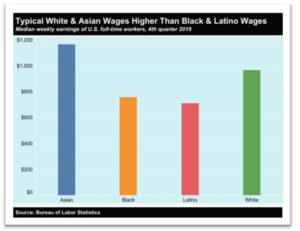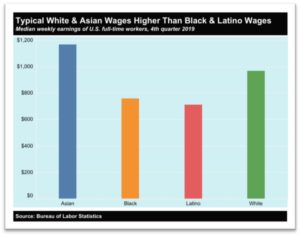We want to make the intent of this message clear; we are in no position to act as experts around the causes for the figures below and/or the causes for the mistreatment of underrepresented populations. Instead, the intent of this message is to publicly state our commitment to continue our learning, our listening, and in turn, our promise to creating action and holding ourselves accountable.*
*This post was updated in May 2023.
Covid-19 Unemployment:
“Sixty-six percent of Latinx households and 44 percent of Black households have had a job or wage loss due to the pandemic, compared to 38 percent of White households.” (inequality.org/facts/racial-inequality)

Pre-Covid-19 Unemployment:
“The unemployment rate for Black job-seekers remains nearly twice as high as for Whites, according to the Bureau of Labor Statistics data. In December 2019, when many were celebrating “full employment,” the unemployment rate for Blacks was 5.9%, compared to just 3.2% for Whites and 2.5% for Asians.” (inequality.org/facts/racial-inequality)

Annual Earnings:
“As of the last quarter of 2019, the median White worker made 28 percent more than the typical Black worker and more than 35 more than the median Latino worker), according to Bureau of Labor Statics.” (inequality.org/facts/racial-inequality)

Postsecondary Graduation Rates:
“The 6-year graduation rate for first-time, full-time undergraduate students who began their pursuit of a bachelor’s degree at a 4-year degree-granting institution in fall 2010 was highest for Asian students (74 percent), followed by White students (64 percent), students of Two or more races (60 percent), Hispanic students (54 percent), Pacific Islander students (51 percent), Black students (40 percent), and American Indian/Alaska Native students (39 percent).” (Https://Nces.Ed.Gov/)
The above statements are facts. There is no denying them. Over the course of the last few weeks, as the world has mourned, grieved and fought for justice for George Floyd. This catalyst forced us to witness the impact of systemic racism that is further demonstrated in the figures above. While we are still learning, what has unfolded before us has caused us to take time to better understand the landscape we live in. Now is the time for us to build upon an awareness of systemic inequalities, develop new skills to have effective conversations, and in turn, do our best to move the needle for ourselves, our clients, and our communities.
As a small, woman- and family-owned recruiting firm, we’re fortunate to partner with some of the nation’s leading public and private institutions, impactful non-profit organizations focused on the environment, leadership, and food access, as well as cutting-edge companies that are helping to shape the future of the built environment, data, retail, and human services. We pride ourselves in striving to understand the diversity goals of our clients, regardless of industry, and to provide them with incredible talent. This is why at the end of 2019, we launched an internal program designed around the AIRS Diversity and Inclusion Recruiter certification to continue to educate ourselves on diversity hiring and inequities, so that we can work to address these issues. While the AIRS Diversity and Inclusion Recruiter training is tactile in nature, equipping our team to have better tools to access diverse talent, it has opened the door to more in-depth conversation.
To complement the tactical training, we are engaged in monthly, dedicated dialogue around diversity recruiting and how to effectively help our partners hire great talent. While we are proud of our efforts and the progress we have made, we recognize this is a lifelong process. What we can do right now is to continue to focus on educating ourselves and dedicating time and effort to outlining actionable items that we will hold ourselves accountable to.
The figures above are particularly important to us in this moment as they represent a fundamental, systemic issue around hiring for diverse talent. The unemployment rates, both pre-, in the midst of, and post-COVID-19, are eye-opening figures and clearly highlight racial inequality. In turn, the availability of diverse talent for salary levels we typically recruit for is staggering. This is why it is important for us to take a look at the last fact above – an inequitable access to and retention through education for underrepresented demographics. Now more than ever are we aware of and honored to support institutions that aim to address student enrollment, retention, and the development of diverse leaders. While the role we may play in this is small, we are devoted to our partnership and this moment is not lost on us.
We are committed to our learning, to doing better, and to holding ourselves accountable for the following goals:
- Provide a visible, quarterly report on our growth and understandings as well as our diversity recruitment efforts on our website.
- Create awareness and educate our partners, clients, candidates, and community on diversity recruitment best practices
- Share talent pool demographics with hiring teams pre- and post-engagement.
We are open to hearing from you.

CEO and Owner of Another Source


